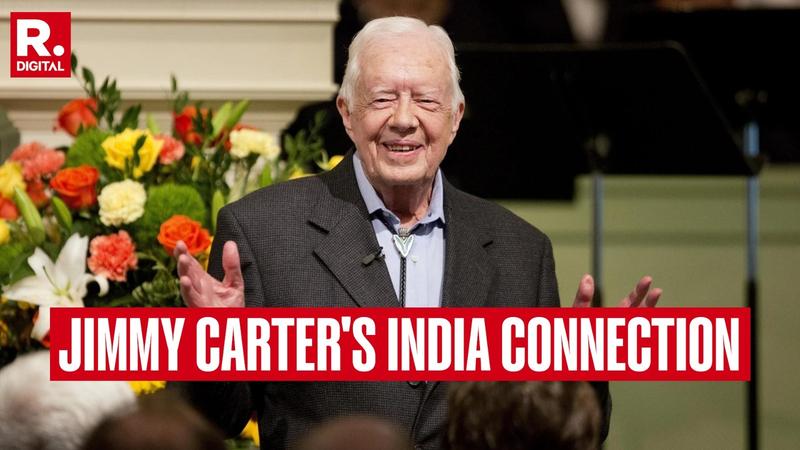Published 09:59 IST, December 30th 2024
Jimmy Carter's India Connection: This Haryana Village was Named 'Carterpuri' in His Honour
Former US President Jimmy Carter Dies at 100; Village in Haryana Named After Him

Washington: Former US President Jimmy Carter, whose legacy as a statesman and humanitarian touched lives worldwide, passed away at the age of 100 on Sunday. He breathed his last at his home in Plains, Georgia, as confirmed by the Carter Center.
Carter, who served as the 39th President of the United States from 1977 to 1981, was the longest-lived president in American history. During his presidency, Carter visited India in 1977, leaving behind a unique connection—a village in Haryana was renamed Carterpuri in his honour after his visit.
Tributes Pour in for a Global Icon
President Joe Biden and First Lady Dr Jill Biden mourned Carter's demise, calling him an extraordinary leader and a man of great compassion. In their statement, the Bidens highlighted Carter’s six-decade-long efforts in promoting human rights, eradicating disease, and fighting for the underprivileged.
“Jimmy Carter was a man of great character, courage, and optimism. He saved and transformed countless lives across the globe. His love and partnership with Rosalynn Carter will remain a symbol of patriotism and humility,” they said, adding that the world would miss them dearly but take solace in knowing the couple is now reunited.
Carter’s son, Chip Carter, remembered his father as a hero who believed in peace and brought people together through his ideals. “My father wasn’t just a hero to me but to everyone who believes in peace, human rights, and love. He made the world our family,” Chip said.
Known for his advocacy for civil rights, housing for the homeless, and efforts to promote free and fair elections, Carter's post-presidency years were dedicated to humanitarian work. His commitment to eradicating diseases and fostering global peace earned him respect far beyond his presidential term.
Carter is survived by his children Jack, Chip, Jeff, and Amy, along with 11 grandchildren and 14 great-grandchildren. He was predeceased by his wife Rosalynn, who passed away earlier, and one grandchild.
President-elect Donald Trump said while he "strongly disagreed" with Carter "philosophically and politically", he also realised that he truly loved and respected "our country, and all it stands for".
"He worked hard to make America a better place, and for that I give him my highest respect. He was a truly good man and, of course, will be greatly missed. He was also very consequential, far more than most Presidents, after he left the Oval Office,” Trump said.
Carter was considered a friend of India. He was the first American president to visit India after the removal of emergency and victory of the Janata Party in 1977. In his address to the Indian parliament, Carter spoke against authoritarian rule.
“India's difficulties, which we often experience ourselves and which are typical of the problems faced in the developing world, remind us of the tasks that lie ahead. Not the Authoritarian Way,” Carter said on January 2, 1978.
“But India's successes are just as important because they decisively refute the theory that in order to achieve economic and social progress, a developing country must accept an authoritarian or totalitarian government and all the damage to the health of the human spirit which that kind of rule brings with it,” he told members of parliament.
“Is democracy important? Is human freedom valued by all people?... India has given her affirmative answer in a thunderous voice, a voice heard around the world. Something momentous happened here last March, not because any particular party won or lost but rather, I think, because the largest electorate on earth freely and wisely choose its leaders at the polls. In this sense, democracy itself was the victor,” Carter said.
A day later at the signing of the Delhi declaration along with then Prime Minister Morarji Desai, Carter said at the heart of the friendship between India and the US is their determination that the moral values of the people must also guide the actions of the states, the governments.
“The United States gave the world an illustration of a new form of government, with a new relation between the citizen and the state — a relation in which the state exists to serve the citizen, and not the citizen to serve the state,” he said.
“India experimented with creating political unity from overwhelming human diversity, enabling people of different cultures and languages and religions to work together, both in independence and also in freedom. Yours is an experiment whose success the world is celebrating anew,” Carter said in the Ashoka Hall of the Rashtrapati Bhawan.
(With PTI Inputs)
Updated 10:31 IST, December 30th 2024




